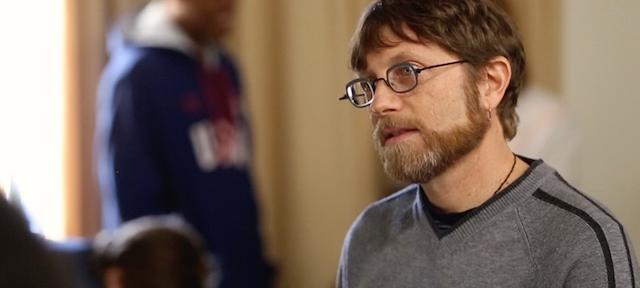Hampshire Appoints Timothy Zimmerman to Endowed Professorship Honoring Jonathan Lash

Hampshire College has named Timothy Zimmerman to its first Jonathan Lash Endowed Chair in Environmental Education, a professorship founded last year by the Board of Trustees and Academic Affairs Division to honor President Lash’s tenure.
Funded by gifts from more than 100 donors and growing, the endowment supports the professorship that in turn benefits the academic program and students and helps the College increase its total endowment, all which have been priorities for President Lash, said Chair of the Board Gaye Hill.
Eva Rueschmann, vice president for academic affairs and dean of faculty, announced the appointment this week. Zimmerman joined Hampshire in 2013 as visiting professor of cognition and education from Rutgers University, where he was assistant professor of science education. “In his almost five years at Hampshire, Tim has been fully engaged in our campus community,” Rueschmann said, “mentoring students, serving on many committees, and developing and teaching courses on such topics as environmental education, sustainability, and environmental action.”
After receiving his bachelor's and master’s degree in marine biology, Professor Zimmerman earned his PhD in science education from the University of California Berkeley. Over the past 17 years, his research and teaching have centered on designing and implementing curricula that promote environmental stewardship. In all, he’s been teaching for some three decades, in higher education, museum and aquarium education, and outdoor environmental education. He’s driven, he says, by the belief that environmental education is essential to the well-being of individuals, societies, and the planet.
Lash announced last February that he will retire this June, at age 72, following his seventh year in office. “I feel very proud to have my name associated with environmental education at Hampshire, helping students who I know will make a difference in the world,” Lash said. “I’m delighted that a dedicated and creative teacher like Tim has been selected to be the first holder of the Lash Chair. I’m profoundly grateful to Hampshire and the scores of donors who fully endowed it.”
On behalf of the board and donors to the fund, Gaye Hill said, “Jonathan has led the College with openness and collaboration. He’s been excited and inspired by the accomplishments of students, faculty, and staff. He has led with his heart, and that’s why donors — as a tribute to him — are funding this endowment.”
To fund the chair, the trustees set a goal of $2.6 million in private gifts; to date, more than $2.5 million has been raised. [Learn more about giving to the fund.]
Lash was honored by Hampshire trustees, faculty, staff, and friends at two retirement events this spring. See photos from the events.
“I’m honored and humbled to carry on the legacy of Jonathan Lash’s tireless efforts to protect the natural world and promote justice,” Professor Zimmerman said of his appointment. “Hampshire’s commitment to academic rigor in tandem with real-world experiences, its dedication to environmental sustainability, and its ongoing social-justice work make it the perfect place for fostering the next generation of environmental-education change-makers. I’m excited to get started in this new role.”
Zimmerman will be based in the School of Cognitive Science to ally the natural sciences and the social sciences — education, conservation, and psychology — with environmental ethics and justice. He has already developed a strong, collaborative relationship with the College’s Cultural Village partner, the Hitchcock Center for the Environment, through which he will cultivate important learning opportunities for Hampshire students.
“We’re thrilled that Tim will continue to inspire our students to become educators, scientists, activists, and policymakers, addressing one of the most pressing issues of our time,” Rueschmann added.
Visit Tim Zimmerman’s faculty profile page.
Jonathan Lash's Tenure at Hampshire
Jonathan Lash was named the sixth president of the College in 2011, joining Hampshire as an internationally recognized expert on global sustainability, climate change, and environmental challenges and solutions. He has been recognized by two U.S. presidents, who appointed him to serve on national environmental councils.
Among Hampshire’s achievements during Lash’s tenure, the College:
- Instituted a mission-driven admissions policy to enroll students for whom Hampshire presents the opportunity to thrive, refusing to accept SATs because they lack predictive value and are biased against low-income families
- Developed an investment policy that is leading the nation in ethical and socially responsible practices, increased the endowment by 80 percent, and almost doubled annual philanthropic investment
- Revitalized learner-centered pedagogy, giving students and faculty new platforms to ignore intellectual boundaries by endowing professorships and creating innovative programs including Ethics and the Common Good, Entrepreneurship, and Knowledge Commons
- Enriched Hampshire as a community of inquiry by increasing the diversity of the student body, faculty, and board of trustees
- Met more student need by increasing financial aid from 85 to 94 percent of need met, and increasing total grant and merit aid from $27 million in 2011 to $32.5 million in 2018
- Differentiated itself in the higher-education marketplace by communicating the distinctive soul of the institution to the right constituents.
Since 2011, under Lash’s guidance, Hampshire has led a sustainability initiative to transform its operations, curriculum, food systems and culture to further its goal of sustainability. Building on a decades-long practice of environmental science, studies, and stewardship, the College has been acting aggressively on the initiative and has taken enormous strides. To cite recent progress, Hampshire today is
- Supplying, on an annualized basis, 100 percent of campus electricity using on-campus photovoltaic systems; these systems are rated at 4.9 megawatts DC output
- Fully divested from fossil fuels in its endowment investments
- Modeling sustainable design as the home of higher education’s largest certified Living Building, the R.W. Kern Center, the 17th facility certified under the most rigorous green-building design standards (watch the video A Living Laboratory: The R.W. Kern Center narrated by Jonathan Lash)
- Collaborating with four other New England colleges on a pioneering renewable-energy effort that will offset 46,000 megawatt hours per year of their collective needs using electricity created at a solar-power facility to be built in Farmington, Maine. The partnership will enable Hampshire to power its 15 off-campus properties using solar energy
- Increasing the use of its farm and other local sources to supply campus food
- Operating more efficiently after establishing a Sustainable Revolving Fund to increase investment in and implement energy-saving renovations
- Reducing emissions and saving money by returning mowed lawns to natural meadows
- Moving closer to achieving the goals in its Climate Action Plan, to make the campus climate neutral by 2022
Hampshire’s environmental stewardship began as soon as the College was founded. In 1971, Hampshire faculty launched the Environmental Quality Program. In 1978, Professors Lorna Coppinger and Ray Coppinger documented its creation in their chapter, titled “The Agricultural Liberal Arts,” in Fields of Learning: The Student Farm Movement in North America.
Jonathan Lash Before Hampshire
An internationally accomplished environmental leader, Jonathan Lash came to Hampshire in 2011 from his previous role as president of the World Resources Institute, a Washington-based, global environmental organization on whose board he still serves. He was appointed by President Barack Obama to the Blue Ribbon Commission on America’s Nuclear Future and by President Bill Clinton to cochair the U.S. President’s Council on Sustainable Development. Lash played a key role in the creation of the U.S. Climate Action Partnership, which in 2007 issued the “Call to Action” on global warming.
Earlier, he was secretary of the Vermont Agency of Natural Resources, Vermont’s commissioner of Environmental Conservation, and director of the Environmental Law Center at the Vermont Law School.
Lash, who holds an MEd and a JD from Catholic University, began his legal career as a federal prosecutor and later became senior staff attorney for the Natural Resources Defense Council (NRDC). He was lead author of A Season of Spoils: The Reagan Administration’s Attack on the Environment (1984), which detailed how President Reagan chose business advocates to lead environmental policy for his cabinet, a decision that ended in controversy and resignations.
He received his AB from Harvard College and upon graduation joined the Peace Corps, where he met Eleanor Scattergood, a fellow volunteer, whom he married. Read his full bio.



